Ten covert police operations that took place under Spain’s PP government
Illegally spying on former Popular Party treasurer Luis Bárcenas was just one of the jobs carried out without judicial oversight by a group of officers who also disseminated false evidence against Catalan separatists and the leftist party Podemos. EL PAÍS has reconstructed events based on testimony from their targets
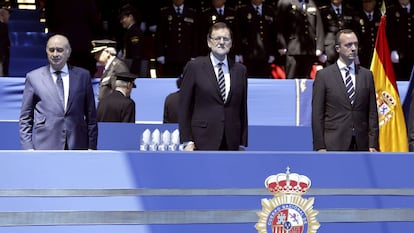
Jorge Fernández Díaz first stepped into his new office inside Spain’s Interior Ministry on December 22, 2011, just a few days after the Popular Party (PP)'s victory at the general election under the leadership of Mariano Rajoy. The first thing that the veteran conservative politician did, even before accepting the leather portfolio from his predecessor, Antonio Camacho of the Socialist Party (PSOE), was to ask an odd question: “Did you guys ever commit any irregularities?”
Camacho says that he was surprised at the question, and that he answered no. A few minutes later, Fernández Díaz solemnly made the following statement to reporters: “I want everyone to know that I have evidence that the Interior Ministry has never at any time put the rule of law on hold. And it will not do so in future, either.”
Perhaps that was truly his intention, but the fact remains that just a few months later, a series of apocryphal police reports began to emerge disseminating false information about Catalan politicians involved in separatist activities. Over the course of the five years that followed, other similarly covert operations were carried out by a group of high-ranking members of the National Police working for the Interior Ministry under the PP administration, without judicial authorization or oversight.
Fernández Díaz, his secretary of state for security Francisco Martínez and half-a-dozen police officials are now the targets of a court investigation into an alleged illegal spying operation against the PP’s former party treasurer Luis Bárcenas. A judge at Spain’s High Court, the Audiencia Nacional, recently lifted the seal on an inquiry into a covert operation paid with fondos reservados – state funds earmarked for national security that are not held up to public scrutiny. Operation Kitchen, as it was codenamed, aimed to find and destroy any incriminating evidence that Bárcenas might be holding against members of the Rajoy administration.
Bárcenas was a key figure in a long-running scandal involving allegations of illegal corporate donations and under-the-table cash bonuses for top PP officials, including Rajoy himself. In early 2013, this newspaper revealed the existence of handwritten ledgers, known as los papeles de Bárcenas (the Bárcenas papers), suggesting a parallel bookkeeping system for undeclared party funds. The former treasurer was also found to have millions of euros stashed away in Swiss bank accounts.
The Bárcenas case was part of an even larger scandal known as the Gürtel case involving kickbacks, fraud and money laundering. Dozens of people were convicted in May 2018, and the public outcry helped pave the way for a successful no-confidence vote against Rajoy led by Pedro Sánchez of the Socialist Party (PSOE).
But spying on Bárcenas was just one of the covert operations that went on under Fernández Díaz’s tenure at the Interior Ministry. All the police operations shared several traits: for one, they were never authorized by a judge and therefore there was no judicial oversight; in many cases they fabricated “evidence” against adversaries of the PP executive, then leaked that information to certain media outlets. Sometimes documents against Catalan separatist leaders were obtained through extortion, while other times information that might be damaging to the government would get stolen.
EL PAÍS has reconstructed 10 of these operations based on testimony from their victims.
1. Spicing up a report to sink a Catalan premier (October 2012)
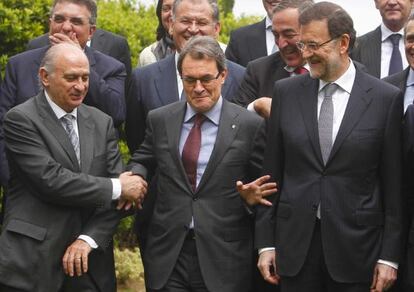
The Catalan premier at the time, Artur Mas, had called regional elections on November 25, 2012 in the hopes of securing a pro-independence majority. In the months leading up to the polls, some members of the police launched a disinformation campaign using alleged reports that contained serious accusations against Mas and other political leaders. “I woke up one day to a headline in El Mundo claiming that I had money stashed away in Switzerland. It was absolutely false,” says Mas. “I spent the rest of the campaign trying to prove something that I could not prove: my innocence, because it was all a pack of lies. Nobody would believe me. I’m sure it cost us quite a few lawmakers, we lost 12 seats. At a personal level, this was shattering for my father during the last few months of his life.” Mas is convinced that it all happened “with consent from La Moncloa [the seat of Spanish government].” Mas filed a complaint against the newspaper, but the case was shelved. “The judge said that the reporters had contacted the Interior Ministry to determine whether the report was credible, and the reply had been affirmative.” Mas took his case to the European courts, and he is still awaiting a decision. “The feeling you get is that anything goes, that here’s a brazen breach of the rule of law and that the courts, instead of protecting you, shelve the case. It was a campaign run by a political apparatus – the PP – along with a media apparatus and a ‘parapolice’ apparatus,” adds Mas, under whose term in office Catalonia held a non-binding independence vote in November 2014 that predates the unauthorized referendum of October 1, 2017. In early 2017, Mas was tried for disobedience and barred from office for two years for authorizing a vote ruled unconstitutional under Spanish legislation.
The charges against Mas were based on a police report that bore no date, no signature and no seal. The resulting scandal led the ministry to launch an internal investigation. The man in charge of the probe, Internal Affairs police chief Marcelino Martín Blas, said the following inside Catalan parliament: “We discovered that the report was a cut-and-paste of other official reports and that somebody, and we never found out who, had added a bit of ‘spice’ to the text by introducing accusations of tax evasion against Mas and others.” None of it turned out to be true.
2. The penthouse that ended a Madrid premier’s career (November 2011-March 2015)
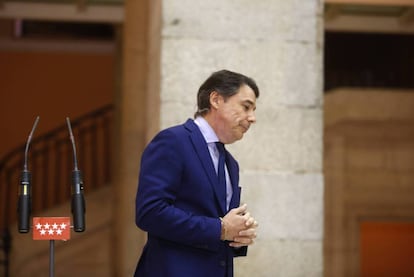
Then-interior minister Jorge Fernández Díaz told his top aide Francisco Martínez to go talk to veteran police chief José Manuel Villarejo about a matter that was making life complicated for Ignacio González, a fellow PP politician who was then serving as the deputy premier of the Madrid region. In the fall of 2012, the media reported on a luxury penthouse used by González in Estepona, on Spain’s Costa del Sol, which he and his wife first rented and later purchased at what was described as below market prices.
Before that, in November 2011, González himself had met with Villarejo, who is currently at the center of a huge investigation involving 20 years' worth of phone taps, undercover recordings and other invasions of privacy against scores of politicians, business people, judges and journalists. At that 2011 meeting, held inside a cafeteria in Madrid’s Puerta del Sol, Villarejo offered to solve González’s problems. But true to form, Villarejo also secretly recorded the conversation, and produced it four years later, on March 9, 2015, three months ahead of regional elections, in order to ruin González’s political career. The latter had been serving as Madrid premier since September 2012.
Villarejo boasted to his friends about having personally caused González’s downfall by deliberately leaking that conversation. Top PP officials were aware of this operation against González, according to Villarejo’s testimony, although they allegedly had last-minute regrets. Eight years after the scandal broke, a judge shelved the case on the basis that there was not enough evidence to prove that someone had gifted the attic to González in exchange for favors.
3. Villarejo’s mission to undermine the Gürtel case (July 2009)
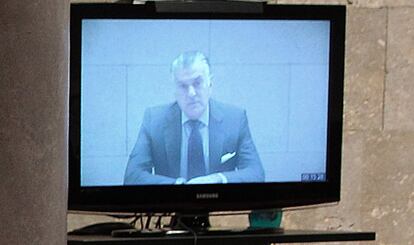
Villarejo, who describes himself as an “undercover agent” on his own resume, had been getting jobs from the PP ever since the conservative party began suffering from the effects of the Gürtel case, a sprawling kickbacks-for-contracts scandal that ultimately ended the career of Mariano Rajoy in a no-confidence vote in June 2018. In July 2009, a few months after the case broke, Villarejo met with Dolores de Cospedal, then the party’s secretary general, inside her office at PP headquarters in Madrid. There, he told Cospedal and the latter’s husband, Ignacio López del Hierro, that he and other police officers were at their disposal to obstruct the Gürtel investigation and try to minimize damage to the party.
As usual, Villarejo secretly recorded the conversation. “I’ve got my wallet on one side and my heart on the other,” he is heard saying. “My heart is yours. Every time you guys are in power, I never make money, but every time the Socialist Party (PSOE) is in power, they’re so disastrous that they always end up giving me jobs.”
Villarejo told Cospedal and her husband of the attempt to eliminate a pen drive in the possession of party treasurer Luis Bárcenas; he also said that top PP officials had been warned ahead of time about impending raids and other operations. López del Hierro is heard saying: “Would you be willing, for instance, to do the occasional job on specific matters?” Cospedal adds: “Don’t worry about discretion issues.”
4. A botched search for Bárcenas' secrets (June 2013-June 2015)
Four years after that semi-secret meeting at PP headquarters, Villarejo and Inspector Andrés Gómez Gordo, a former official in the government of Castilla-La Mancha when Cospedal was its regional premier, took charge of Operation Kitchen, which a judicial inquiry has described as an attempt to steal incriminating information from the disgraced PP treasurer Luis Bárcenas. Villarejo and Gómez Gordo persuaded Sergio Rios, Bárcenas’ chauffeur, to work for them. He was paid €2,000 a month between June 2013 and June 2015 to pass on information about where the couple kept sensitive information about the party.
In the meantime, nearly 70 officers were sent out to trail Bárcenas’s wife, Rosalía Iglesias. Amateurism was always a significant element in this spying work by the PP’s “political police.” On one occasion, Villarejo tasked Bárcenas’ chauffeur with obtaining the wife’s cellphone number so they could tap it. One day, when Rosalía Iglesias momentarily left the phone inside the car, Ríos grabbed it and placed a call to his own phone, so the number would be registered. But then he did not know how to delete the record of the outgoing call from Iglesias’s device. The chauffeur was eventually offered a position with the National Police as a reward for his efforts.
Ultimately, the stolen documents lacked any real relevance, and in any case they were leaked to the media even before a court could get its hands on them.
5. Jordi Pujol’s accounts in Andorra (June 2014)
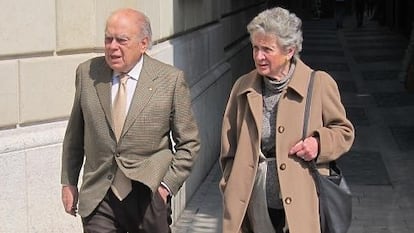
In late 2012, a line of investigation against the family of Jordi Pujol, who served as Catalan premier between 1980 and 2003, made significant headway. The Pujols had already been targeted by ghost reports published by El Mundo with headlines such as: “The Pujols have €137 million in Geneva, according to the police.” But the investigation really came together when María Victoria Álvarez, a former girlfriend of the eldest son, also named Jordi Pujol, told the police what she personally knew about the family’s accounts in Andorra, a microstate between Spain and France that is considered a tax haven. She later gave the same information to a judge.
The police were on the case but the money had not turned up. Then, in the spring of 2014, officers working under Eugenio Pino, who was the head of the police department Dirección Adjunta Operativa (DAO) and a high-ranking official within the Interior Ministry, decided to target Banca Privada d’Andorra (BPA). Bank executives were told to cooperate with information about the Pujols’ accounts or prepare for action against the lender’s Spanish affiliate, Banco de Madrid, according to testimony from the bank owners. Joan Pau Miquel, the CEO of BPA, met with Internal Affairs police chief Marcelino Martín Blas at Villamagna Hotel in Madrid in June 2014, and handed him a slip of paper showing a bank account, the names of Jordi Pujol, his wife Marta Ferrusola and one of their daughters, and several amounts. Another police officer who went to Andorra managed to save a screenshot of the Pujols’ account, showing a balance of €3.4 million.
But Pino did not go straight to the judge with the information, which was published a few days later by El Mundo. Jordi Pujol was forced to admit two weeks later that he had funds in foreign bank accounts, leading to a public scandal. A former Banco de Madrid official remembers those events: “The police did not believe that that’s all there was [the money]; they believed there was over €100 million and that the bank was not cooperating fully. In the middle of that pressure, somebody informed US authorities about alleged money laundering at BPA”. In March 2015, the FinCen [the Financial Crimes Enforcement Network of the US Treasury Department, an anti-money-laundering unit] named BPA “a foreign financial institution of primary money-laundering concern” based on information suggesting that it “knowingly facilitated transactions on behalf of third-party money launderers acting on behalf of transnational criminal organizations.”
That same month, the Bank of Spain stepped in to take control of Banco de Madrid and the latter has since been involved in insolvency procedures. “They took down a bank in good financial health for nothing,” says the same ex-official. They based it on a report by Sepblac [Executive Service of the Committee for Prevention and Money Laundering, which answers to the Economy Ministry] that was inconsistent and leaked to the media. There were four trials and nothing was ever proven. The US later pulled its own report. More than 200 employees lost their jobs; we went to court and were told to pay the legal fees. They covered things up. It was injustice on a galactic scale.” Bank executives took legal action in Andorra against police officials over coercion claims in a case that is still open.
6. The non-existent Swiss account that brought down the mayor of Barcelona (October 2014)
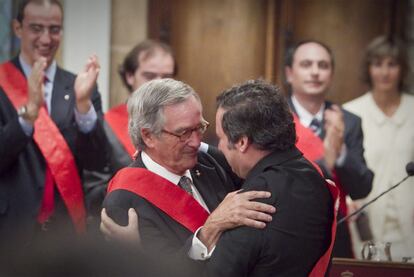
In late 2014, the situation in Catalonia became tense again when the regional government headed by Artur Mas announced an unauthorized independence referendum for November 9 of that year. Before that, on October 2 and 16, Jorge Fernández Díaz had met with Catalonia’s anti-fraud chief, Daniel de Alfonso, inside the former’s office. The conversation was recorded with the minister’s authorization (as he himself later admitted) and it was revealed in 2016 by the online daily Público. At this meeting, both men conspired to set up a new operation against the mayor of Barcelona at the time, Xavier Trias of the moderately nationalist coalition Convergence and Union (CiU), now defunct.
Fernández Díaz and De Alfonso discussed an alleged Swiss bank account held by Trias, and noted how well the operation against Jordi Pujol had turned out. Just days later, on October 27, El Mundo ran a story about an alleged Swiss bank account in Trias’s name holding €12.9 million. “It was totally false. It happened six months before the municipal elections of May 2015. My wife said to me, ‘No matter what you manage to prove, the damage is done, you’ve lost the election.’ And so it was,” recalls Trias. “The most astounding thing is that, at the time, the parties did not do much about it. Later, when more information began to emerge about the cesspit of the state, they did, but when it happened to me, nobody paid attention.”
Three days later, the Swiss bank UBS sent a statement denying the veracity of the claim: they did not have a client with that name, and the account number did not match any at the lender. The Spanish police, who presumably leaked the document in the first place, then filed a complaint with prosecutors, but the claim was shelved. A top police aide travelled to Switzerland to find out why they’d been given false information, but came back empty-handed. Trias took legal action against El Mundo but lost the case. “The judge said that the reporters were not to blame because the source was credible: it was the Interior Ministry.” “It seems unreal that such things can happen under a rule of law. They say: ‘We’re going to take this guy down,’ they achieve their goal, and nothing happens.”
7. Media weapons to politically destroy Podemos (January 2016)
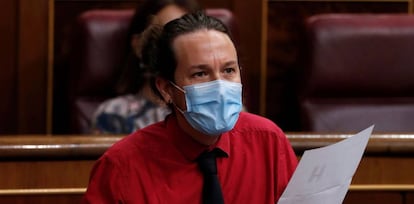
At the general election of December 2015, Podemos secured 69 seats and became the third-largest force in the lower house of parliament, the Congress of Deputies. Its lawmakers were now in a position to obstruct the formation of a new PP government. Just a few days later, DAO chief Eugenio Pino, who was as loyal to the interior minister as the latter was to Mariano Rajoy, ordered his most trusted officers to send the Audit Court a damning report on Podemos and its leader, Pablo Iglesias.
The report bore no signature, its authorship was unclear, and it appeared to have been hastily put together. Just 23 days after the elections, it was published by the online daily Ok Diario, which claimed that a police document proved that the Iranian government had funded Iglesias’ political career. Manos Limpias, a union created by far-right figure Miguel Bernad, used this document as the basis for filing a crime report that was shelved. Weeks later, the police used the same document to file a complaint with the Audit Court, which also shelved it.
Pablo Iglesias says that he spoke on several occasions with Fernández Díaz and the latter always said he had nothing to do with it. “He wasn’t going to say ‘yes, as a matter of fact I’ve sent some guys over to tear you to pieces,’” notes Iglesias in conversation. “One of the chief characteristics of the report against me is how crudely it was crafted. Not even the most receptive judge could possibly have taken it into account as evidence. The goal was not to put me in jail, since they had obtained no proof of any illegal activities. The so-called PISA report [for Pablo Iglesias S. A., but also a play on the international educational assessment report] was meant to provide fodder to tabloids and even allegedly respectable media outlets in order to establish a lingering lie about illegal financing by Podemos.”
Iglesias underscored the media value of the police operation that targeted him. “Villarejo built up his media clout. This police officer is who he is thanks to his contacts in the media world, and it is unacceptable that we should take in stride statements such as ‘a journalist’s job is to meet individuals like Villarejo over dinner.’ I think that signals the beginning of the end of democracy.”
The campaign was not solely aimed at Iglesias. Another Podemos leader, Juan Carlos Monedero, recalls how he was the target of the same strategy. “False reports get drafted by the state apparatus and leaked to specific media outlets to create a social construct about you being a criminal. At one point I was dealing with up to 12 private criminal complaints, and for three days there were reporters stationed outside my house 24/7. In the end all the complaints got shelved, but it doesn’t matter, people already think that you are a criminal.” Monedero adds that it was a very intense period in his life. “They create a very hostile environment and point you out as though you were public enemy number one. And the only thing you’ve done is found a party that might hurt them. Yes, there was a moment when they managed to rattle me.”
8. A “new life” for a former minister of Venezuela in exchange for evidence against Iglesias (April 2016)
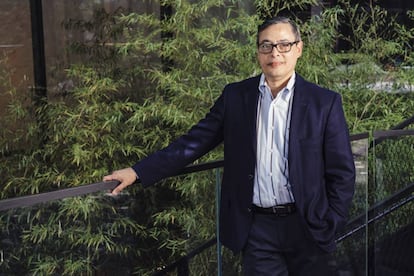
On the first week of April 2016, the online dailies El Confidencial and Ok Diario ran stories saying that Venezuela had paid €7 million to Podemos leaders Pablo Iglesias and Juan Carlos Monedero, and to Jorge Verstrynge, a former politician and political scientist who helped found the party. The latter recalls that at first he dismissed the story, but later became concerned. “Someone from intelligence [services] warned me that they were going after Pablo,” he says. “[The source] said that they were going to metaphorically kill him. I warned him. He had been expecting it.” The news story was based on an alleged document signed by Rafael Isea, a former finance minister under Venezuela’s Hugo Chávez. Three officers from the Spanish National Police travelled to New York a few days later to meet with Isea to verify the authenticity of the document. The meeting took place inside the Spanish consulate, and the police officers, who said they represented the government, promised to get Isea’s family out of Venezuela and offer them “a new life” in exchange for testimony against Podemos. A police officer named Fuentes Gago reportedly said: “If you help us prevent the Podemos people from making it [to power], goddammit, it will be better for everyone.”
Chávez’s former minister agreed to the deal despite noticing odd things about the document: “I don’t usually write in that style; the dates and names didn’t sound familiar, and nobody ever used Chávez’s second surname,” recalls Isea. A month after that meeting, his statement appeared in print in the conservative newspaper Abc, but the promises vanished. In June 2019, Isea told his story to EL PAÍS: “They manipulated me with a very delicate matter, they placed my family at risk. For several months I was under tough pressure, waiting for the reaction by the Venezuelan government. That is why I never spoke up until now. We’re talking about lives at stake. We’re talking about an 80-year-old lady whom I can’t even see. I trusted in a government that told me it could get my mother out of there.” But Isea never again heard from the police officers who had made that promise.
9. A phony payment order in the Grenadine islands (May 2016)In May 2016, the police leaked information to Ok Diario regarding a payment order worth $272,325 (€229,000) made by the Venezuela government to the name of Podemos leader Pablo Iglesias at a branch office of Euro Pacific Bank in the Grenadine islands. The date on the order, March 11, 2014, coincided with the date when Podemos registered to run in the European elections of May 25, 2014. A Venezuelan citizen named Carlos Alberto Arias secured a residency permit from the Spanish Interior Ministry in exchange for cooperating with the police by producing documents regarding payments by the Venezuelan executive to Podemos and Pablo Iglesias, as Arias himself later admitted. The document turned out to be phony, as confirmed by the Euro Pacific Bank.
10. A telephone theft turns into a smear campaign (June 2016)

Dina Bousselham, an advisor to Pablo Iglesias in the European Parliament, filed a police report on November 1, 2015 stating that her cellphone had been stolen. Two months later, the phone’s memory card, which contained sensitive information, made it to the newsroom of Interviú magazine, allegedly inside an envelope with no return address. The card ended up in the hands of the police chief Villarejo, who asked the magazine director to hand it over because, as he said, his bosses at the Interior Ministry were interested in its contents.
The contents that were most likely to damage Iglesias’ reputation – some sexist remarks he made about a female reporter – were published in Ok Diario a few days after Villarejo, as his agenda reflects, had met with reporters from that media outlet. Villarejo, who has been in preventive prison since 2017, has been charged in connection with that incident.
“What really makes Villarejo great is that he is a media professional,” notes Iglesias. “What we went through was not the cesspit’s ability to produce fake evidence, but its tremendous ability to produce fake news. A disregard for the truth has become the norm, not the exception. I think that in the media wars, a wartime logic has been adopted in that anything goes; the goal of the headline, of the conversation topic, is never to see the truth or the facts in a specific manner, but to wage war on the adversary. And that leaves our democracy in a very vulnerable position.”
English version by Susana Urra.
Tu suscripción se está usando en otro dispositivo
¿Quieres añadir otro usuario a tu suscripción?
Si continúas leyendo en este dispositivo, no se podrá leer en el otro.
FlechaTu suscripción se está usando en otro dispositivo y solo puedes acceder a EL PAÍS desde un dispositivo a la vez.
Si quieres compartir tu cuenta, cambia tu suscripción a la modalidad Premium, así podrás añadir otro usuario. Cada uno accederá con su propia cuenta de email, lo que os permitirá personalizar vuestra experiencia en EL PAÍS.
¿Tienes una suscripción de empresa? Accede aquí para contratar más cuentas.
En el caso de no saber quién está usando tu cuenta, te recomendamos cambiar tu contraseña aquí.
Si decides continuar compartiendo tu cuenta, este mensaje se mostrará en tu dispositivo y en el de la otra persona que está usando tu cuenta de forma indefinida, afectando a tu experiencia de lectura. Puedes consultar aquí los términos y condiciones de la suscripción digital.








































